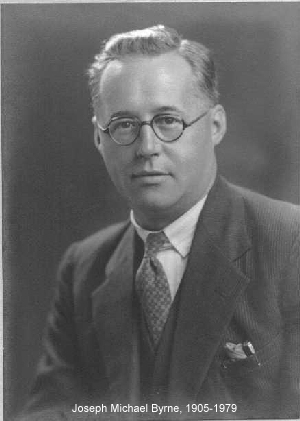

 Joseph Byrne, Liverpool to Ireland, 1905-1979Joseph Byrne was born in Bootle, on 17 June 1905, to Michael Byrne and Mary Ann O’Flaherty. Being an only son, and coming from a long seafaring tradition, Joseph might have been expected to follow in his father’s footsteps and go to sea. However his interests always inclined towards the academic. Indeed, by the time Joseph started at St James’ Elementary School,
Bootle, he was already able to read. But he had more frivolous interests
too - loving comics and the cinema. Up until old age, Joseph could recite
verbatim whole dialogues from Billy Bunter. He used to go every Saturday
to his local cinema to watch silent films, each week the serials would
end with an exciting cliff-hanger – for example, the heroine tied
to a railway track as the train approached – encouraging viewers
to return the following week to see the outcome. On 14th April 1912, when Joseph was six years old, the Titanic hit an iceberg and sank. Joseph read the news, with shock, from the newspaper headlines, touted on the streets of Liverpool. At six, he was aware enough to register the significance of the disaster, probably partially because his own father worked for the White Star Line. Two years later, in 1914, Joseph was again to read startling news from
the newsvendors on the streets of Liverpool. This time it was the announcement
of War. At the age of 11, in 1916, Joseph started Secondary School. He attended St. Edward’s College, or, the Liverpool Catholic Institute, as it was then known. The school was run by the Christian Brothers. Joseph kept a photograph from his time at St Edward’s and, although time has erased memory of which boy in the group photo is actually Joseph, we think that he must be the one on the right of the front row. That boy’s age is around 11 so we guess that this photo was taken around 1916, shortly after Joseph joined St Edward’s. What we do know for certain is that the photo was taken on the front steps of what is now the 6th Form Centre at the school. Passing the University of Oxford School Certificate in 1919, Joseph
would have dearly loved to study at Oxford. However, at that time, the
Church frowned on Catholic attendance of Protestant institutions. Instead,
following matriculation and just gone 15, he joined the Christian Brothers
in July 1920. At the time there was no Christian Brothers’ Training School
in Liverpool so Joseph travelled to St Joseph’s College, Baldoyle
in Dublin. He took his religious habit in October of the same year,
adopting the name of Brother Pacificius. Teacher training, at the CB
Training College in Marino, Dublin, started exactly one year later. Living in Dublin would have been no hardship for Joseph as it afforded him the opportunity to visit his maternal aunt, Dora Duffy (née O’Flaherty) and his cousins in Dún Laoghaire. Many happy afternoons were spent by Joseph, at the Duffy’s residence, and, thankfully, we have lots of photographs from these times. Joseph’s first teaching assignment was to the O’Connell
School, North Richmond Street in August 1922. He stayed there until
at least 1925. In September 1926, during the Irish Civil War, Joseph was sent back
to England, assigned to St Joseph’s CB School in Blackpool. His
Joseph did return to Ireland at some stage between 1929 and 1934, taking the opportunity to visit his O’Flaherty cousins in Wexford Town. Wexford Town had been the holiday destination of his childhood and he had many family ties there. Life then took a surprising turn for Joseph Michael Byrne, or Brother Pacificius.
In Easter 1934 Joseph applied directly to Rome for permission to leave the Brothers. When the permission came, it was sent to the Bishop of Lancaster. The Bishop called at the College and did his best to dissuade Joseph from leaving but he was not successful. Joseph left in September 1934. CB records note, with some surprise, that Joseph “did not go to Bootle, his native place, but to Dublin”. Many years later Magdalen would describe her surprise when Joseph appeared
unannounced, and apparently un-encouraged, at her Dublin residence.
Joseph and Magdalen married in 1936 and went to live in Clones, Co Monaghan, where Joseph was working. Since the Church had banned him from teaching, as punishment for leaving religious orders, he took up employment in the newly established Free State as a Social Worker. He worked in that capacity from March 1935 until his retirement in July 1970. The shame of having left religious orders was such that Joseph hid
his past. He destroyed all photos of himself as a Christian Brother,
even cutting treasured photos in half to obliterate his own image. While Joseph remained a devout Catholic all his life, pursuit of knowledge was his driving force. Fluent in several languages, he is known to have studied many disciplines. Also artistic, he passed Academy of Art examinations. He learned Irish in later life and Spanish when he retired to Spain, where he was finally allowed to teach again. He wrestled with the complexities of the Russian language up until his death in 1979.
Joseph and Magdalen had six children and lived in Clones and various addresses in Dublin while their children were young. They left 17 grandchildren, including myself, and numerous great grandchildren. |
||